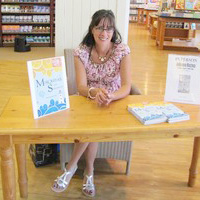Atlantis mystery captures seaside memories
Remember the carefree days of childhood summers spent lazing at the beach, digging in the sand, craving adventure and fun? That’s what Julianna Kozma delivers - to kids and nostalgic grownups alike - with her second book for young adults. In Secrets of the Dunes, sisters Hannah and Emily uncover the secrets of a lost continent.

“It’s all about adventure and mystery, good guys and bad guys, finding Atlantis and exploring what real friendship is,” Kozma says. The novel is the second in Kozma’s Hannah and Emily Morgan mystery series.
The story is set in Prince Edward Island, where Kozma and her husband have a house at which they’ve spent summers with their two daughters.
If you’re at all familiar with P.E.I. as a summer playground, you’ll recognize Cavendish beach and the Greenwich Dunes. The island’s Twin Shores camp ground, Avonlea Village and Rainbow Valley (the recently shut amusement park beloved by a generation of young visitors), appear in the first book.
Kozma kicked off her literary career when the manuscript for her first book Mosquitoes of Summer won the 2009 Book Idol award. Her prize: help getting the book self-published and a launch at Indigo bookstore in Montreal. Unbeknownst to her, contest organizers had submitted the book to several Canadian publishers.
“During the launch at Indigo, watching on a big screen in front of the crowd, I learned from Kim McArthur of McArthur & Company, that the publisher had accepted my book. I couldn’t believe it!” she says.
A schoolteacher by day, Kozma writes in her spare time - but is no stranger to the craft. She enjoyed a 15-year career as a financial journalist, writing for publications including Canadian Business and Global Finance. When she started a family, she opted for a career change that enabled her to spend more time with her children. She switched to freelance jobs and started teaching.

The main characters in Kozma’s two novels are based on her own children. She feels fortunate to have her writing as a way to document the family’s cherished summers by the sea.
“Kids grow up so fast and it’s sad to see that time go,” Kozma says. “I realized ‘Hey, I’m a writer. Why don’t I put their adventures in writing so that when they’re grown up they can look back?’” She offers the books as a gift to her children, now aged 14 and 17.
“My girls were excited at seeing their antics in print. Now they are always asking me what I will I do to their characters next. They can't wait to read about their next adventure,” Kozma says.
As her children grow up, she is still inspired to continue writing about them. “They have such forceful and enjoyable personalities that transfer well to the written word. However, I have slowed down their aging in the stories, so that I can keep them at a certain age for a while longer. I'm stopping time - it’s like magic!”
Kozma recently explored a new kind of writing. Her darkly engaging and mysterious short story Beautiful Insanity has just been accepted into the inaugural issue of Warpaint, a prestigious short story anthology.
The author is also involved in a literacy program for at-risk youth. She offers workshops to help reluctant writers get over troubles like writers’ block.
“That’s one thing I learned in the journalism program at Concordia. With deadlines to respect, we didn’t have the luxury of writer’s block. One of the tricks is to keep writing. If you maintain a steady pace - even if it’s bad writing - you can write yourself out of a block and fix it up later,” says Kozma, who earned her BA in 1989 with a double major in journalism and anthropology.
“Concordia gave me the tools to practice my craft, as well as the skills and confidence to head out in to the real world.”
Crediting her parents as her biggest inspiration to write, Kozma says, “When I was young, they would constantly tell me incredibly creative stories and that love for storytelling stayed with me over the years. Now that I have a family of my own, I can continue that tradition of storytelling and give my children that same gift that my own parents gave me.”

